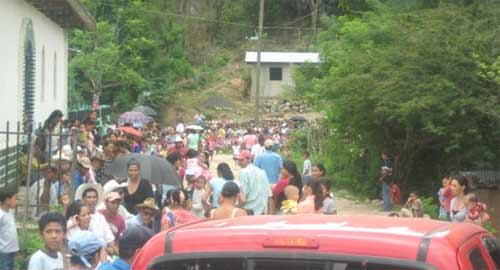Beneficent Brigades
UCSB Students Revolutionize Honduran Healthcare

If any university club holds the record for medically treating the most patients in one day, it might just be the UCSB chapter of Global Medical Brigades (GMB). Every summer, 30-40 members of the UCSB club head down to Honduras with a group of health professionals and suitcases full of medical supplies and spend six long days providing medical care to 250-1,500 people a day who live in poor, rural villages with limited or no access to health care. “The whole experience was life-changing,” said chapter founder Daniel Mizrahi of his first brigade trip. “You see a wide variety of medical conditions. But not only that, you also learn about people and different cultures,” he said.
The UCSB brigade is one of more than 50 university clubs nationwide that constitute GMB, a secular, nonprofit, and student-led relief organization. In the fall of 2006, Mizrahi began the months-long task of forming the club. “It was one of the biggest challenges of my life. I can say that without any hesitation. But I had a lot of help,” he said. Much of that help came from Ashley Alker, president of the club in 2008, and Leo Ramsey, current president and former housemate of Mizrahi. This summer, Ramsey and 32 other UCSB students along with 11 doctors, three from Santa Barbara, will be treating patients from June 15-20.
Once GMB volunteers arrive in Honduras, they are stationed in Nuevo Para-so (“New Paradise”), a perhaps presciently named village outside of the capital city, Tegucigalpa. Everyday, they will travel from Nuevo Para-so to a different village where they transform a building – usually a school or church – into a health clinic with a triage station, consultation area, makeshift pharmacy, and eye and dental stations. Students check patients in, take vitals, and dole out vitamins as well as assist the doctors with everything from performing ear lavage to suturing.

Because GMB’s Honduran partner, the nonprofit organization Sociedad Amigos de los Ni±os (SAN), advertises weeks in advance that a brigade is coming, hundreds of people will already be waiting outside the soon-to-be-created medical clinic when GMB volunteers arrive. Some patients will likely have traveled long distances over rough terrain from other remote villages to get medical care. The students and doctors do not leave until they have treated every patient. “It’s crucial for everyone to work together,” Mizrahi said. “And it’s a truly beautiful thing when there is harmony among the entire group and you successfully treat 1,000 people a day.”
Students usually return home with a bizarre mixture of touching, rewarding, horrifying, and disheartening stories. Because many of the patients live in extreme poverty, they often have health problems as a result of dietary deficiency, lack of adequate health care, or poor living conditions. Sometimes preventable medical conditions become untreatable.
Jessica Reader, current co-vice president, said one day a mother came in with a malnourished six-month-old baby who weighed seven pounds. “That really impacted me because we could not do anything about it. The baby was going to die. It’s hard to see something like that and not be able to help more. The more in sustainable health care that we do, the fewer children we’ll see malnourished.”
Sarah Bridges, also co-vice president, said the first time she went down, she felt like she wasn’t making a difference. “I almost didn’t go again, but then I realized it would be worse for me to turn my back on it. I’m so glad I kept with it.” This summer, she will go on her third brigade. “We are there so we can have more happy stories.”
GMB volunteers serve villages where many of the residents do not have access to sanitary facilities such as latrines, clean-burning stoves, and concrete floors, placing them at risk for respiratory problems, water-related illnesses, and other diseases.
By having rotating cycles down in Honduran villages throughout the year, the GMB clubs as a whole are able to provide sustainable health care. But a major difference in malnutrition and disease has to come from improving the quality of life and community infrastructure, such as access to potable water. Therefore, GMB also works in conjunction with its sister organizations, Global Water Brigades and Global Business Brigades. In addition, GMB itself has also begun to implement some sustainable health care solutions.
Recently, the UCSB chapter began a public health project to reduce the number of patients they treat with respiratory problems. Last year they began stove construction, replacing wood stoves that release smoke inside living quarters to ones that have a pipe and chimney so that the smoke goes outside. Health education, such as teaching people about the importance of boiling water and children how to brush and floss their teeth is also an essential part of the brigade. “With every trip, it feels like we are slowly but surely chipping away at pieces of a big problem,” said Mizrahi. The ultimate goal of GMB is to establish preventable and sustainable health care in these communities.
Although he is in his first year of medical school at Temple University in Philadelphia, Mizrahi is still involved with the UCSB chapter and is going to Honduras with them again this summer. He said although a weeklong medical brigade usually tests some aspect of character, whether physical or mental or both, it is undoubtedly an enriching experience. “At the end of the day, I feel it’s the type of journey everyone should make.”
GMB relies entirely on fund raising. In addition to applying for grants, the UCSB chapter receives some money from UCSB. However, a large majority of its budget comes from donations. If you would like to make a monetary donation or to donate medical supplies, please contact Daniel Mizrahi at dmizrahi1985@gmail.com, Leo Ramsey at leoramz@hotmail.com, Sarah Bridge at sarita.puente@hotmail.com or Jessica Reader at jessicagmb@gmail.com.



